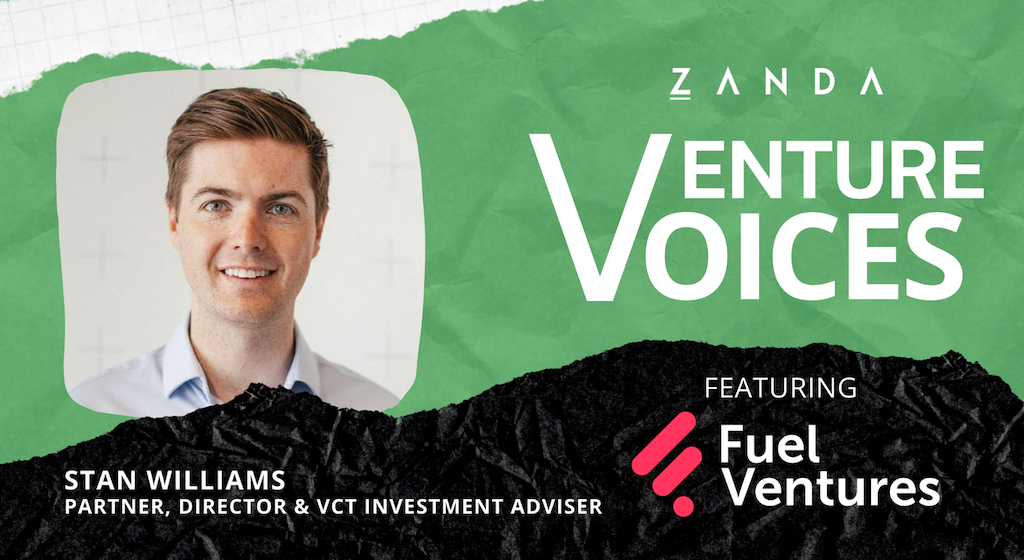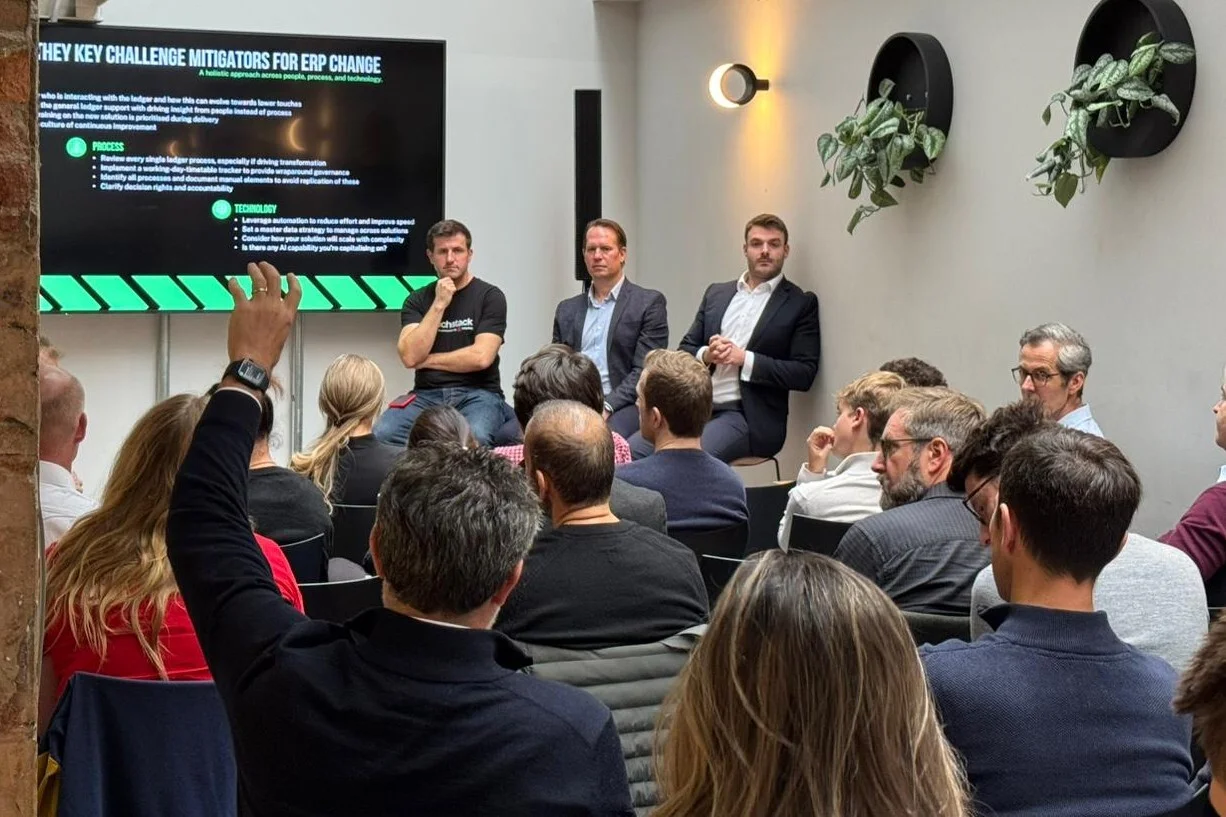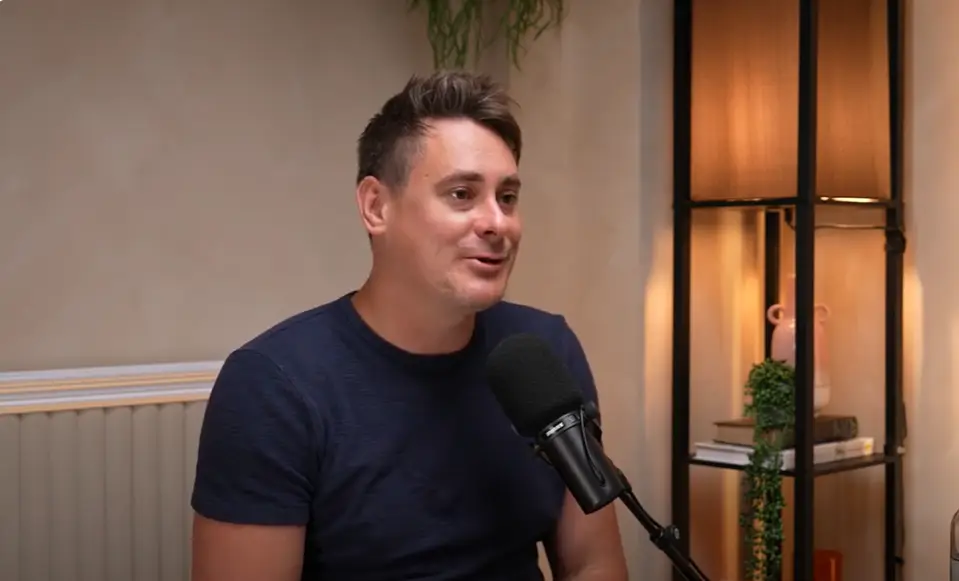Venture Voices | Fuel Ventures
18 Nov, 202410 Minutes
For this episode of Venture Voices we sat down with one of the partners and directors at Fuel Ventures, Stan Williams. Fuel Ventures 🚀 is a Venture Capital firm that focuses on investing in early stage, European technology companies and Stan has been with the company for six and a half years, helping scalable tech deals on their journey toward exit.
Don’t have time to read the entire discussion, use our index to jump to the sections you want to read or watch the full interview on our youtube channel.
Interview Topics
- Why did Stan join Fuel Ventures?
- Description of their various funds and investment portfolios
- Pre-revenue/Pre-seed fund
- No. in Portfolio
- Description of Fuel Ventures investment thesis
- What do Fuel Ventures look for in a company that is looking to fundraise?
- What growth figures do Fuel Ventures expect to see from their portfolio companies?
- Fuel Ventures post-investment resources
- What characteristics stand out in a good pitch?
- Top founder skills of highest performing companies
- What percentage of portfolio companies would benefit from a new CEO
- Founder Burnout
- Main priorities pre-fundraise
- Main focus post investment
- 2025 VC predictions
- If Stan wasn't in VC he would be...
- Book recommendations
Stan, what made you join Fuel Ventures six and a half years ago?
Initially, it was Mark Pearson, our Founder and Managing Partner. When I joined, the firm was still relatively small, and a lot of the decision was based on Mark and his vision. I met Mark, and he struck me as a very humble yet incredibly successful entrepreneur. You often meet people who get lucky once, but Mark succeeded with his own business and has successfully exited multiple ventures. I quickly realized he was smart, with a solid track record of delivering results.
Secondly, I liked what Mark was building. Before joining Fuel Ventures, I spent five or six years at an angel network in London, focusing on early-stage deals — pre-seed and SEIS rounds, typically raising between £100,000 and £300,000. The challenge was always the next step, trying to raise £1-2 million. It’s difficult to get enough angel investors on board for that amount quickly. Additionally, we weren’t providing much post-investment support; we’d introduce founders to angels and then step back.
Mark, on the other hand, was building a fund that could provide startups with a substantial amount of capital while continuing to back them as they grew, easing the fundraising burden. Plus, his approach was hands-on, offering support throughout the growth journey. That really resonated with the challenges I’d seen in the market, and it inspired me to join. Mark often says, “We’re only getting started,” and he reminds me of that regularly, which is great because it shows we’re still growing.

How would you describe your various funds and investment portfolios at Fuel Ventures?
We started investing in 2015, initially through an EIS fund that focuses on seed-stage companies and venture capital investments in high-growth sectors. Our core strategy has always been to write decent-sized tickets at the seed stage. Over time, we’ve expanded both up and down the investment chain. We’ve now launched a pre-seed fund, which can invest up to £250,000 in companies that may not yet have revenue or much traction but need capital to get started. We’ve also created two vehicles to continue supporting our existing portfolio companies — one is an EIS fund, and the other is a VCT (venture capital trust). Both aim to back our top performers as they grow.
And in the pre-seed fund, are you looking at early stage companies that are pre-revenue, or do they typically have some revenue?
What’s really exciting is seeing the ecosystem mature over time. In less mature markets early support often comes from corporate or bank-led accelerators or generic business programmes, helping founders with pitch decks and introducing them to equity. But now we’re seeing much more specialist support layered on top of that foundational guidance.
We see both. Often, we’re investing in startup companies at the EIS stage that already used up their SEIS allowance, which sometimes feels like a missed opportunity. But the second scenario is when we come across great companies with strong founding teams, but they haven’t built out their product yet. They say, “We just need a couple of hundred thousand pounds to get this off the ground.” The pre-seed fund allows us to back those founders, giving them the opportunity to build their product. And if they can generate traction, we’re ready with our next fund to support them further. It’s really about giving early founders a chance — not everyone has friends or family to help raise that initial capital.

Roughly how many companies are in your portfolio now, across pre-seed, seed, and seed-plus stages?
We have about 160 companies in total. It’s roughly split between 90 EIS companies and 70 SEIS companies, with some overlap between the two funds.
Fuel Ventures is definitely a venture capital firm with personality, how would you describe your investment thesis? You seem to be pretty direct about what you're aiming to do.
Yes, I think our reputation is for being ambitious and bullish. We invest in tech companies with a clear goal: we only back companies we believe can deliver at least a 10x return on investment. That’s the bar we set internally. If we don’t genuinely believe a company can hit that, we pass. Some might say that aiming for 10x is unrealistic, but even if we don’t hit that mark, we feel confident that landing halfway will still yield solid returns. It’s a key part of our philosophy.
Another aspect that sets us apart is that we invest with full conviction. When a founder comes to us, raising, say, £2 million, rather than piecing together funds from multiple sources, we often take the entire round ourselves. We move quickly — aiming to close deals within three to four weeks from the term sheet. And once we invest, we stay committed. For companies that meet their targets, we continue backing them. A great example is Hotel Manager — we’ve backed them through every fund we’ve launched, four times now.
I think your straightforward approach is refreshing. While other investors, including venture capitalists, may shift their focus, Fuel Ventures has remained consistent over the last six to seven years. The ease of securing a full £2 million raise from a single investor, rather than juggling three or four funds plus angel money, is a big selling point. It saves founders a lot of time and hassle.

When it comes to pre-investment metrics, what do you look for in a company raising a £2 million seed round? What makes you feel confident going all-in?
We look at several key factors. First and foremost, the founding team needs to be exceptional. Building a company is a long journey — five to ten years — and there will be challenges, pivots, and market shifts. The one constant is the team, so we have to believe in them. Secondly, the business model must be scalable and capital-efficient.
What kind of month-on-month or year-on-year percentages do you expect to see when it comes to growth figures? At what point do you get excited, and at what point do you start to worry?
It’s tricky in the very early stages, but as a company matures, we expect around 3x growth in year one, 2x in year two, and again 2x in year three. By years four and five, that growth usually slows to 1x. Those kinds of numbers are what we love to see. If a company grows 3x in a year, we’re delighted. For companies that reach Series A, growth might drop to between 50% and 100%, which is still okay, but at that point, if it’s lower than 50%, it raises some concerns. It could indicate that their capital isn’t being used effectively. So, we aim for that trajectory, but some of our top performers far exceed those expectations, which is always great to see.
It's interesting because even if growth slows to 20-30% by Series A, that can still be a very sellable business, even if it’s not necessarily a typical Fuel Ventures business anymore. Would you agree?
Yes, absolutely. Even if a company doesn’t hit our typical growth benchmarks, it can still be a fantastic business. The key is recognizing the different types of successes — not every company needs to become a venture-scale giant to be valuable.

In terms of resources or support post-investment, what are the key areas where you really help founders?
When we built Fuel Ventures, we looked at the main challenges founders face and the reasons companies fail. Fundraising came out as the top issue. Founders aren’t naturally fundraising experts; a great technical founder may understand the customer pain point and build a strong product, but that doesn’t mean they know how to sell the business or pitch it to investors. It’s a major reason why otherwise promising businesses don’t succeed.
Developing detailed non-profit fundraising strategies is essential for addressing specific goals and improving future campaigns. We’ve had portfolio companies that were doing well, but when their term sheet fell through, they couldn’t raise new capital, and the company failed. We still think they were strong businesses with great founders, but fundraising was the roadblock.
Then there’s the effective use of capital—raising money is one thing, but using it wisely is another. If a company raises $2 million, and the first million doesn’t yield much growth, now you’re down to a million with much higher stakes. You need to ensure the second million is allocated properly to attract the right customers and channels, which is another pitfall we often see. Fundraising is now a systematic process at Fuel Ventures, guided by a comprehensive fundraising strategy.
To address this, we’ve developed substantial internal resources around fundraising. We have team members who regularly meet with VCs, talk about our portfolio companies, and keep them on the radar. We build long-term relationships with other investors so that when it’s time for a Series A or B round, they’re already familiar with the company. Rushing a company to a venture capital firm they haven’t heard of before and expecting them to write a £10-20 million check just doesn’t work. We’ve scaled this effort far beyond what most VCs do.
The second area is hiring, which is more traditional. I often remind people that when we invest in a company, we’re doing so with a runway of about 15 to 20 months. That’s the timeframe they have to show clear growth and evolution to raise the next round. So, if you’re hiring during that time, you’ve got to be mindful of ramp-up periods and embedding new hires into the team. If you hire the wrong person, you could lose six to eight months before realizing it’s not working. And in that case, the growth targets won’t be met. For example, hiring the wrong sales team or sales manager can really hinder progress.
To combat this we have an in-house talent team that helps founders with key hires. Since a lot of the capital we provide is spent on hiring, we want to make sure they have access to the best talent pool. There’s also a clear benefit from our portfolio approach — if one company interviews a pool of 30 candidates for a sales role and hires two, we still have a list of other strong candidates who could be great for another portfolio company. It’s a really efficient system.
In addition to fundraising and hiring, we meet with founders monthly and provide support in various areas. We also tap into our broader investor network, which includes 1,000-2,000 people. Many of these investors have significant business experience and can offer valuable advice. They also sit on boards alongside us, adding even more expertise. The consistency of those monthly meetings, combined with the other support we provide, is crucial. It keeps everyone focused and accountable, and helps ensure that resources are being used effectively.

When it comes to pitches, what are some of the common traits of the best ones you've seen? Are there characteristics that stand out?
The best pitches are full of enthusiasm and excitement. Other VCs say this too — if we don’t feel energized after the meeting, it’s hard to get behind the company. There’s got to be a buzz, a sense of urgency, something that makes you want to run back to your desk and tell everyone about it. Founders who are passionate about their business always stand out.
Another key is storytelling. The best pitches aren’t formulaic or overly polished; they tell a compelling story about why this business is going to succeed, why others haven’t, and why the timing is right. It’s about painting a clear picture of the opportunity and making us feel like this is a journey worth backing.
Finally, the best pitches create a sense of urgency — they don’t make you feel like you can wait six months and come back to it later. The best founders leave you feeling like you need to act fast or risk missing out.
Face-to-face meetings definitely help you feel that certain buzz, but it's tough for founders because they're doing these meetings over and over again, and it can be challenging to maintain that energy, enthusiasm, and sense of purpose while pitching the same thing repeatedly. But perhaps that’s a test of whether a founder is genuinely passionate about their segment. If they can deliver the same pitch with the same passion and purpose 50 times, then they’re probably truly excited about what they’re doing.
What are some of the soft and hard skills you see in the founders of your best-performing portfolio companies?
The top founders are absolute experts in their industry or sector. They really understand the market and can clearly articulate the pain points and how their solution can be monetized. They often have excellent access within their industry, which gives them a competitive edge. For instance, we have a company in the hotel space where the founder has incredible access to key decision-makers. He can pitch to people in a way that his competitors can’t.
Another key trait is execution. Often, these founders have either done it before or have seen the playbook in action. One example I love is of a founder who didn’t even work in a competing business but for an investor who sat on the board. He observed everything through board meetings, learned the playbook, and then applied it to his own venture in a different market. It’s not necessarily about being a second-time founder, but about knowing where the dots are and how to connect them.

What percentage of your portfolio do you think would benefit from bringing in a new CEO, whether moving the founder to a chairman role or having the founder step back entirely?
I’d say we’ve seen it in around 10% to 20% of cases, mostly in later-stage companies. The original founders are often the best at taking a company from zero to one, but taking it from one to two is a different skill set. This year in particular, we’ve seen founders stepping aside more often, not due to pressure from the board but from personal reflection. Sometimes they realize they’re no longer adding as much value, and someone else could take the company to the next level. We’ve had founders decide to step back and focus on another area of the business, or even leave entirely.
Do you think there’s more founder burnout now than there was two or three years ago?
It’s possible. It feels like we’ve seen more burnout this year, it’s certainly been a tough market, and that’s bound to have an impact. The market is tough, especially the fundraising market right now. I’m always in awe of our founders—what they do is incredible. Their resilience and drive, especially when so many people are telling them it can't be done or that it's not working, is inspiring. After 10 years in this industry, it never stops im pressing me how tough the journey is for founders.
If you were in a founder's shoes—running a $2 or $3 million ARR business and planning to raise a $10 to $15 million Series A early next year—what would your main priorities be before the raise?
First, I’d make sure the team is solid, especially at the C-Suite level. Investors can quickly spot gaps in the management team, so filling those gaps is crucial. I’d also ensure we weren’t raising money with the runway running out. Investors can sense desperation and may take advantage of that. It’s important to raise with enough cash in the bank to be in a strong position. Next, I’d focus on ramping up growth. Whether that means increasing marketing spend or incentivizing the sales team, it’s crucial to show traction. Also, from a practical perspective, I’d get all the data ready—having a solid deck, financial model, and data room in place. Investors shouldn’t be left waiting for weeks while you gather that information. Finally, I’d prepare to tell a compelling story, making it clear how additional capital will drive the business forward.

And once you’ve raised the $15 million and hit your target valuation, what’s next? What do you focus on post-investment?
Typically, you’d have a 30-60-90 day plan. The key thing is to align everyone, including the investors, around the budget and the plan. Even if you discussed these during the pitch, post-investment is the time to ensure everyone’s on the same page. Then it’s about starting to execute—making hires, enacting the strategy, and hitting the ground running.
But it’s essential to ensure there are no misunderstandings. You don’t want to come back months later and realize that there was a disconnect between your plan and the investors’ expectations. That’s where issues can arise if there wasn’t clear communication upfront.
Looking ahead to 2025, where do you think the venture capital market is headed in the next year or two?
I’m cautiously optimistic. We’re seeing some positive signs in the market, and I think we’ll see more rounds being done. By the second half of 2025, I expect we’ll start seeing more exits and IPOs. In terms of broader trends, I think AI will play a big role across the board, including in venture capital. There’s a vast amount of data involved in what we do—whether it’s analyzing total addressable markets or competitive landscapes. AI will be able to handle a lot of that heavy lifting, freeing up more time for us to focus on supporting our portfolio companies and making better decisions.
And if you weren’t in the venture space, what do you think you’d be doing?
I’ve never had a job outside of venture capital, so I’m not sure! I think I’d probably work for one of our portfolio companies, helping them achieve their goals. I don’t think I’d be a founder myself, but I’d be an early hire, someone who’s part of the journey but doesn’t carry all the weight on their shoulders.

Lastly, if you could recommend one book to a founder, what would it be and why?
These days, I’d recommend "Predictable Revenue" by Aaron Ross. It’s a great book for understanding sales models and how to scale revenue predictably. Many of our portfolio companies have built their entire revenue models around that book, and they’ve been some of our best-performing companies. It’s all about putting enough leads into the top of the funnel and knowing how much will come out the bottom.
I'll check that out! Thank you so much for sharing your time and your insights today and I'll catch up again soon.
Thank you, Andrew.



